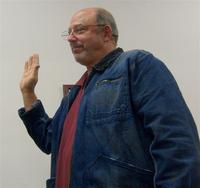Northwest Hill Property to Be Conserved
 |
| David Ranzer takes the oath to serve on the Williamstown Zoning Board of Appeals. |
 |
| David Ranzer takes the oath to serve on the Williamstown Zoning Board of Appeals. |
| If you would like to contribute information on this article, contact us at info@iberkshires.com. |